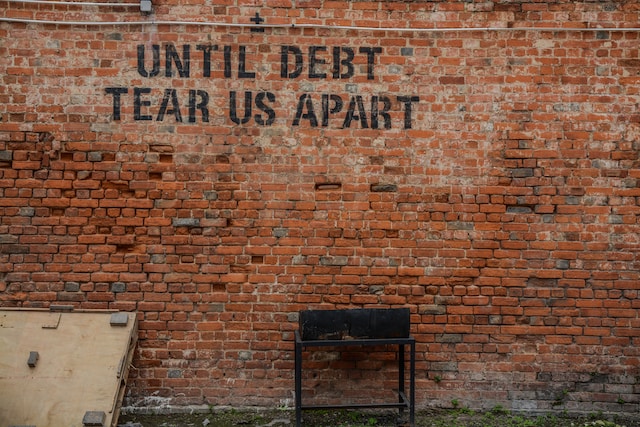“Let’s cancel student debt!”
The notion of having your student debt forgiven and forgotten sounds like a miracle to anyone who has spent hundreds of thousands of dollars on a college education. As someone who has experienced debt forgiveness accidentally, it really is a miracle.
About a million years ago, I attended a prestigious art school in Chicago — for a semester. My parents and I didn’t have the funds for me to continue. As it was, I had already received a federal grant and a loan for about $10,000. Even though I didn’t finish (or get started, really), I was still on the hook for the $10K. So I did what any starving pacifist 20-year old art student does when faced with no job prospects, no place to live, and a mountain of debt. I joined the military. The bank deferred my loan for a year until I could get my act together.
About a year into my service, I decided it was time to call the bank and see about paying off my loan. During that year, the original bank had been bought out by a bigger bank and their records were now in a mess. This was before the internet, so computer records were not as easily transferred as they would be today. They asked me to contact them again in a few months. So I did. And they couldn’t find any record of my student loan. Not one. They didn’t even have my name in an account anywhere. And I’ll never forget the loan officer telling me, “If I were you, I wouldn’t pursue this anymore. You just lucked out big time.” I hung up the phone and wisely walked away.
This is happening now on a much bigger scale to a lot more people. Not the lucky lost records, but the loan forgiveness. I’m not really too sure about how it works, but I think that if the government is offering this to you as a student (or parent), I think you would be crazy not to take them up on it. Take the forgiveness and run. You just lucked out big time.
While this is a boon and a lucky break, it’s not really a solution. It doesn’t address the underlying problems of why people go into debt to get a college education. As I see it, there are three main issues we need to deal with as a society:
- The cost of college is way too high. When your college has a massive LCD screen in the football stadium, that should be a red flag that you’re going to pay too much for your learning.
- The idea that only a person with a college degree should be considered for a job when the skills necessary don’t warrant a college education.
- The assumption that public education followed by a college education automatically makes for better employees.
The High Cost of College is a Scam
Consider this. The average salary for a university administrator is ~$62,000 per year. Think about that. For someone who runs a college where they pump out graduates on the proposition that they will make lots of money with their degrees, that salary seems low. In comparison, the average salary for a McDonald’s restaurant manager is ~$47,000 per year. Not a huge gap there.
Now compare that to how much a four-year education actually costs. At the University of Virginia, for example, a degree in Education and Human Development will run you about $77,000 per year. If I’m doing my math right, that’s more than the average salary for an administrator at the same school. And that’s just the first year. So you would spend $308,000 for a degree that will earn you $62,000 per year. Even if someone else paid all your living expenses and you only used your salary to pay off your student loan, it would take you five years. Admittedly, I did not factor in interest or any grants or scholarship money that would raise or reduce the loan amount.
Regardless of the approximations I’ve made, it does give one pause. What are you actually paying for?
When you consider that you could earn the same degree at a local community college (or online) for a fraction of the cost, it seems like a major rip-off.
Getting Past the Degree Requirement
If you do a cursory job search, a lot of job postings will list a Bachelor’s Degree as a requirement, even though the skills needed don’t warrant a college education. Can you sneak past the Human Resources gatekeeper if you don’t have a degree? Sometimes. These days most corporate firms are scanning PDFs before your resume even gets to a human being, so if a degree isn’t listed, the system may just kick you out before you can speak to a person.
In some cases, you can get to a human being first and get over that no-degree hurdle with charm and a dazzling white smile. But you have to get there first.
But let’s back up for a second. Are there jobs out there that pay a decent (livable) salary without asking for a degree? The answer is hell yes. Take a look at this list on Indeed.com.
If you scroll down a bit, you’ll notice that you can work as a customer service rep and make almost the same as our university administrator — without ever setting foot on a college campus.
These decently-paying jobs also carry the added bonus of not having to pay off a student loan.
There’s also the trade school option to consider. If I told you how much an independent contractor charged us to inspect our chimney, you might reconsider your current career. I sure did.
Does Education Make You Better?
I’ve been working since I was 14, and I have worked with a lot of people in that time. Some of them were super smart and I learned a great deal from watching and listening to them. Others were not so smart and I learned a lot about what not to do. Some of them had college degrees and some didn’t.
So what makes a good employee? If you strip away the education part, it really comes down to getting along with people and being able to solve problems.
You can learn those things in college, but it’s not a guarantee. I’ve worked with a few people who have multiple degrees yet they have terrible people skills and they can’t figure out how to navigate their working or personal lives without struggling — or using a severely underpaid/overworked assistant.
Yet I do think that having a good education can help someone be a better employee. How you use the knowledge you gained in college can help you solve problems faster and more easily than someone who doesn’t have a similar grasp of that knowledge. But that idea dismisses those who earned a degree but didn’t actually retain what they learned. Even if you’re really good at studying and passing tests, it doesn’t necessarily mean you can effectively utilize that knowledge later. The book learning doesn’t always translate to the job.
On the same token, a person who is very well-read and knows how to do research might be able to easily keep up with their college-educated coworkers.
The degree creates an assumption. Science teaches us not to make assumptions.
It’s About the Debt, not the Education
I don’t mean to disparage anyone who has a degree. It’s quite an achievement and you should be proud if you have one. My intent is not to discourage folks from going to college. Our daughter is soon to have her Associate’s in three major areas, and we are very proud of her. In fact, I believe there are plenty of benefits of getting a higher education that you’ll carry throughout your life; friends, diverse experiences, the feeling of accomplishment, and let’s not forget the learning itself.
What I hope you’ll do is take a step back and look at a college education from all sides, and not assume that it’s the one path to a fulfilling career and life. It may be that for some, and it may not be for others.
Ultimately, I want to change the way our society assumes that student debt is a necessary evil. The solution to student debt is not to cancel it every few years, but to find a way to avoid falling into that trap in the first place.
Featured image by Alice Pasqual on Unsplash


Leave a Reply